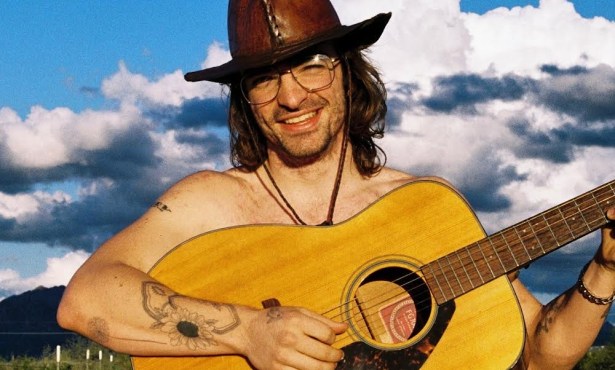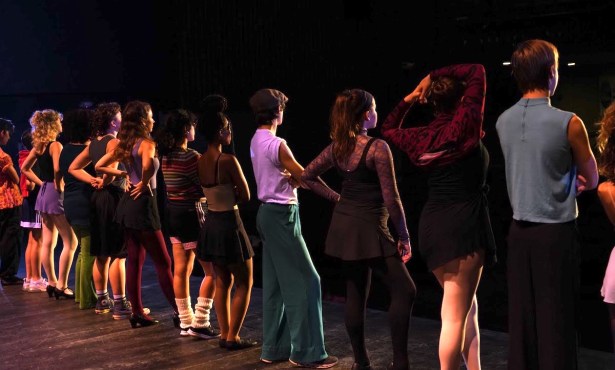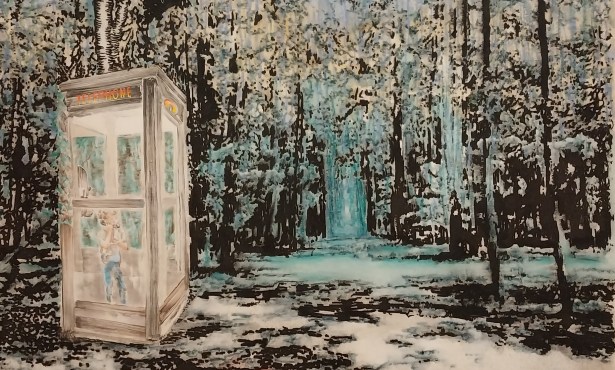SBIFF Directors’ Panel Includes Cameron, Tarantino
Great Chemisty with Six Industry Leaders
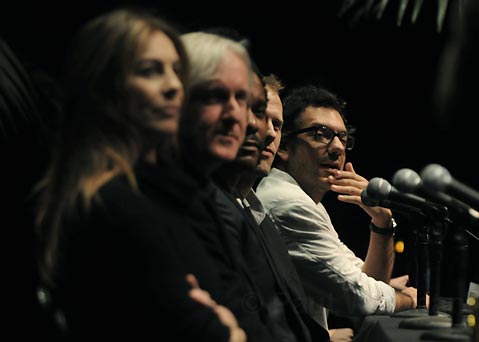
Always an interesting affair, this year the SBIFF Director’s Panel took on truly epic dimensions, with six incredible directors, each of whom is having a stellar year, and all talkative types who are having fun with major success: Kathryn Bigelow, James Cameron, Lee Daniels, Pete Docter, Todd Phillips, and Quentin Tarantino. Not a shy one in the bunch, unless you include Bigelow, who says that now, after years of putting up with it, she is actually enjoying doing the press associated with an Oscar nomination.
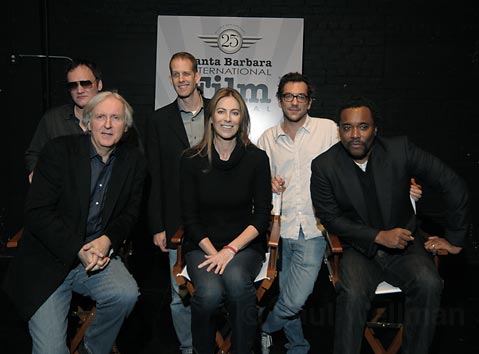
Peter Bart did a great job with the questions, keeping it moving and still probing deeper when necessary. He opened with some inside Hollywood stuff about Todd Phillips’ lack of a significant back-end deal on The Hangover as reported in Vanity Fair. Phillips, who made the highest grossing comedy of all time this year, and who has already won a Golden Globe for it, wasn’t having any of Bart’s gossip. “As far as the $40 million check is concerned, I don’t know what you are talking about,” he said, “but on the awards side, I think I always saw it as a horse race between The Hangover and The Hurt Locker.”
Bart asked James Cameron about a recent news item citing increased demand by exhibitors for 3-D screens and projectors. Would Cameron take credit for moving the industry into a new platform? Cameron would not, but he did have several things to say about the different ways that studios are approaching the process, citing unspecified studios where, “It’s a top down process where movies that are already in line for production suddenly become candidates for 3-D because there are these screens out there. With Avatar the idea of 3-D was there from the start, as an organic part of the concept.” Cameron said he hoped we would not see 3-D become something applied by studio chiefs like a rubber stamp on scripts that were not conceived as 3-D films.” At this point, Lee Daniels got the first really big laugh of the morning by suggesting that he would have made Precious in 3-D if he “had the budget.”
After everyone stopped laughing, Bart declared that this panel had set a record for the longest a panel has ever gone that had Quentin Tarantino on it without Tarantino speaking. Tarantino laughed and Bart asked him if, having seen Avatar, he would consider leaving his genre explorations behind and doing something more technically demanding. Tarantino, mock-incredulous, shot back, “Why, because it’s in 3-D?” But then he went on to give a serious answer, saying “Actually, had I seen Avatar before I made Kill Bill, then that might have had an influence. When I was directing it in my head, when I was first imagining it so that I could write it, I imagined something that was even more of a ride than what I finally got, so there was this impulse to do something more than I could in that form, yes. In my ‘most’ vision of Kill Bill, it could have been more like what I felt when I saw Avatar in 3-D, which was, ‘This is it, this is the ride I was imagining.’”
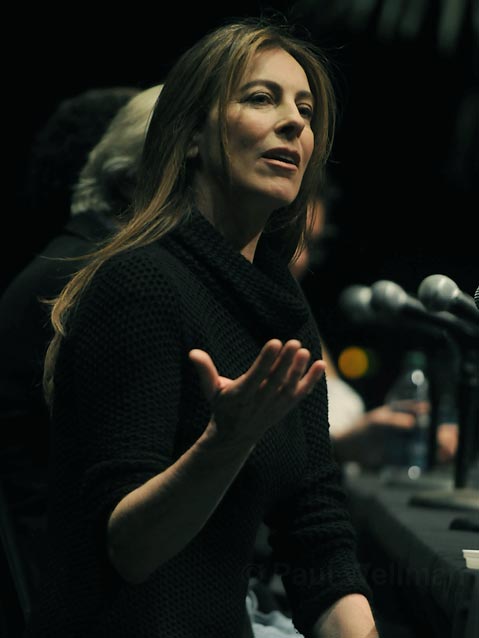
Bart turned to Kathryn Bigelow, who was seated immediately to his left, and began with another appeal to the heavy industry crowd in the Lobero by discussing budgets. He said that he hoped Bigelow was now requesting at least three times what she used to for a picture. When Bigelow said that she could always use more money on a picture, Cameron got a laugh by interjecting that he could have used a bigger budget on Avatar. This led back to Cameron and a discussion about sequels. Bart began by mentioning that Rupert Murdoch had already been talking about Avatar 2. Cameron replied that he was happy to hear that Murdoch had made that statement because he was looking forward to negotiating the terms for that film, especially with Murdoch’s early public commitment to it. This got a laugh, and Cameron continued seriously, saying, “Avatar was of course conceived and pitched as a series of films, in part to recoup the expense of creating this world, which is now saved on a hard drive, and can be flipped on again to make another anytime. At least that’s what I said in the pitch meeting. But I have done several sequels before, and there is an art to it. You have to provide a certain comfort level, because people are coming back for more of something, but you also need to play against their expectations.”
Bart asked Lee Daniels if he encountered any interference from the studio with his artistic process on Precious. Daniels joked that he had no problems because when there were questions, he always “came in with my guns.” Bart continued with Daniels, offering him a special award for the high quality of his acceptance speeches. Daniels said that his participation in the awards and in panels such as this one “always comes from the heart.” He continued “I am sincerely honored to be up here with these geniuses. You know, here I am and this guy [indicating James Cameron] is talking about how it was on Aliens, or Terminator, or Titanic, and I’m sitting over here thinking ‘and Precious.’ How does that sound? So that’s why you speak from the heart, because you are in such distinguished company.”
Bart asked Pete Docter if he ever thought about ending Up after the first five minutes because they were so perfect. Docter said, “Up was a tricky film to get going because of the premise. I was glad we didn’t have to go to Hollywood with it as a pitch and go into people’s offices and say, ‘It’s about an old man flying his house.’”
Bart asked Phillips if he had lined up anything to do after The Hangover. Phillips replied that he had already finished shooting another film called Due Date with Robert Downey Jr. and Zach Galifianakis. He said, “The biggest thing for me after having a successful film is just to get right back to work so that I don’t get gun shy.”
Bart took an abrupt turn and asked Quentin Tarantino if he ever planned to make a love story. Tarantino replied that he already had written one, “Something called True Romance,” an answer that elicited some loud cheers. Tarantino went on to say, “Just because a movie has James Gandolfini beating Patricia Arquette and then she kills him with a shotgun doesn’t mean it’s not a love story. Kill Bill could be seen as about the end of a marriage. If I am going to make a love story, I am going to do it my way because that’s what people want from me—they like it that I do things my way.”
Bart asked Bigelow if she ever worried that The Hurt Locker would “get lost” on the way to market. Bigelow said that in her process of attempting to unpack the whole conflict, there was a parallel process of the topic becoming timelier, so that as the film grew, the audience followed. Then she wondered aloud to Bart, “Why don’t you ask me about making a love story?”
Bart then asked Cameron about the night he first screened Avatar in 3-D. He said that Arnold Schwarzenegger and Steven Spielberg were both there, along with all the cast. Cameron said that the governor is a friend, and that Spielberg had asked to come early on when he heard about the 3-D process, so he was expecting him all along. Then he said, “Making Avatar was like painting a pointillist painting. There were all these smaller finite tasks that had to be done before I could finally step back and see the big picture.”
Cameron went on to talk about directing the performances in the capture studio. He said that in some ways it was more performance-centered than a live action film because the director is not thinking so much about things like losing the light, that it neutralizes all the non-performance concerns that often take up so much of the director’s time on a location.
Bart broke away from that discussion and redirected to Phillips, asking him if his work was to just put goofy guys in a room together, roll camera, and say, “Lose it.” Phillips said that there was something to that description, because it would “be kind of a waste to hire Will Ferrell and then stand over him with a script saying ‘now just read it like I wrote it, okay?’” Phillips then got off the day’s first huge zinger, adding, “I’m also often quite high when I direct, so there’s that.” After the laughter died down, he said to Bart, “I’m sorry, I forgot the question.”
Bart came back at Phillips with a question about casting The Hangover. He wanted to know if Phillips had deliberately stayed away from some of the bigger comedy stars when casting it. Phillips said yes, that he felt there were “eight or so faces that you kind of keep seeing in comedies, and it makes things more difficult in some situations, because it’s like Ben Stiller needs eight or 10 minutes of screen time just to clear away his last role and get the audience to accept this new character.”
Bart then asked Daniels if he wanted to revisit some of the early criticisms of his film that had come out of the black community. Daniels acted outraged, wailing, “Why you want to start this Peter? What are you doing in front of all these pretty white folks bringing this up? Why?” And then he answered the question, saying, “There’s no way for us to grow as black people if we don’t address some of the problems we have at home.” Referring to the critic who dissed his film, Daniels said, “He missed it, but I won’t miss him when I see him around town.”
Daniels went on to praise his actors, saying that he knew many of them gave their souls because they believe it is a privilege to work on a film. He cited the fact that even stars sometimes go for long periods without work.
Pete Docter was asked if he cared which category Up won for, best picture or best animated feature? He replied that, while they are working on a movie at Pixar, they don’t think much about what category it will be in. He said, “When people come up to me and say, ‘My kids love your movies,’ that’s the same to me as if an adult were saying it.” He went on to say that the script process for Up took five years, and that that was an indication of the temptations of a large budget.
This remark kicked off a round of observations from the whole panel about the concept of an unlimited budget, with Tarantino finally coming down on the idea because he feels he needs to work against constraints, and that an unlimited budget would “almost become like an obstacle.”
Bart then reminded Tarantino of the fact that he had once said that he would stop directing at 60. Tarantino remembered making the comment, and said, “Although now that I think about it, if I turn say, 62, and there’s this script I really want to make, and the money is there, it’s not like I’m going to look back and say, ‘Wait, I told Peter Bart I wouldn’t do this on that panel once like 20 years ago.’” Then Tarantino went on to say how he would like to retire, and how he would like to be remembered. “I would like to be a teacher of film, but I wouldn’t teach filmmaking, I would teach history of film. I would write monographs about directors and genres that I liked, and just educate people about all the great films there are. And my films are intended to work as a filmography. I want a kid who hasn’t even been born yet to catch one of my movies some day, on whatever screen they have at that point, and then ‘discover’ me and my movies, the same way that I discovered Howard Hawks. And my hope is that my films have this quality where even if you have no idea about my life, or what period of my career any particular film I have made is from, then you can still take one of them and watch it and get me, get the thing that I do. Everything I do should seem connected, all the way back, so that it all feels like it was made by the guy who made Reservoir Dogs.” Then Tarantino checked out to the restroom.
Bart then asked Bigelow if she minded being in the spotlight thanks to her nomination for best director. She said no, that she was enjoying it, but that on the set as a director she does not feel in the spotlight, but rather she said she feels invisible.
This got Cameron going on the topic of communication, and he said, “Ticket sales are just a metric of communication, because when you have people who are coming back to a film for the second and third viewing in the theater, you know you have reached them.”
Bart asked the panel if they thought Tarantino had left because Bart had offended him. Right as he said it Tarantino returned and kissed Bart on the forehead.
The session went on for another 25 minutes as the panel took a series of questions from the floor. The overall mood was expansive and almost giddy, an appropriate response to an amazing year for all of the participants.

